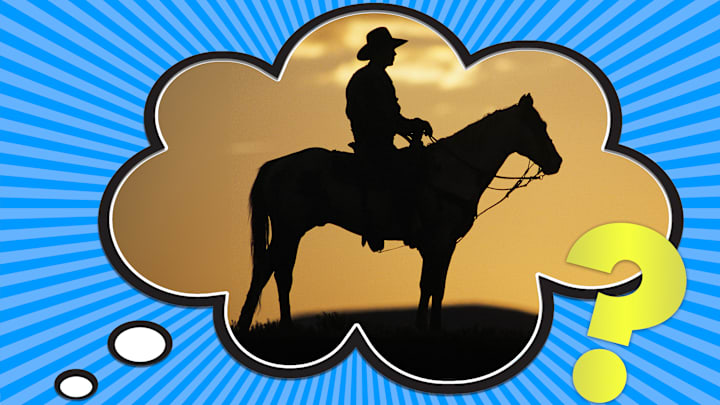Horses may no longer be the dominant form of transportation in the U.S., but the legacy of our horseback-riding history lives on in language. When telling people off, we still use the phrase ... and the horse you rode in on. These days, it’s rare for anyone you’re telling to go screw themselves to actually be an equestrian, so where did and the horse you rode in on come from, anyway?
The Meaning and Origins of the Phrase ... And the Horse You Rode in On
Well, let’s start with the basics. The phrase is, essentially, an intensifier, one typically appended to the phrase f**k you. As the public radio show A Way With Words put it, it’s usually aimed at “someone who’s full of himself and unwelcome to boot.” According to co-host and lexicographer Grant Barrett “instead of just insulting you, they want to insult your whole circumstance.”
The phrase can be traced back to at least the 1950s, but it may be even older than that, since, as Barrett noted, plenty of crude language didn’t make it into print in the early 20th century. He suggested that it could have been in wide use even prior to World War II.
In 1998, William Safire of The New York Times tracked down several novels that employed the term, including 1972’s The Friends of Eddie Coyle (which has Coyle telling a woman who has annoyed him, “f**k you, lady ... and the horse you rode in on”) and No Bugles, No Drums (1976). The editor of the latter book, Michael Seidman, told Safire that he heard a version of the term (“and the white horse you rode in on and all your relatives in Brooklyn”) growing up in the Bronx just after the Korean War, leading the journalist to peg the origin of the phrase to at least the late 1950s.
The Many Fans of the Phrase
The phrase has had some pretty die-hard fans over the years, too. Donald Regan, who was Secretary of the Treasury under Ronald Reagan from 1981 through 1984, worked it into his official Treasury Department portrait. You can see a title along the spine of a book in the background of the painting. It reads: “And the Horse You Rode In On,” apparently one of Regan’s favorite sayings.

The book in the painting didn’t refer to a real book, but there have since been a few published that bear similar names, like Clinton strategist James Carville’s …and the Horse He Rode In On: The People V. Kenneth Starr and Dakota McFadzean’s 2013 book of comics Other Stories And the Horse You Rode In On.
The phrase has also been used as an album title more than once: Soul Asylum called their fifth studio album, released in 1990, And the Horse They Rode in On (yes, there was a horse on the cover); Australian singer/songwriter James Reyne used the phrase for his seventh album, released in 2005, as did the band Lynn Allen for their record released in 2007 (no horse cover art for either of those albums, though).
It seems that even in a world where almost no one rides in on a horse, insulting a man’s steed is a timeless burn.
Have you got a Big Question you'd like us to answer? If so, let us know by emailing us at bigquestions@mentalfloss.com.
A version of this story ran in 2017; it has been updated for 2024.
